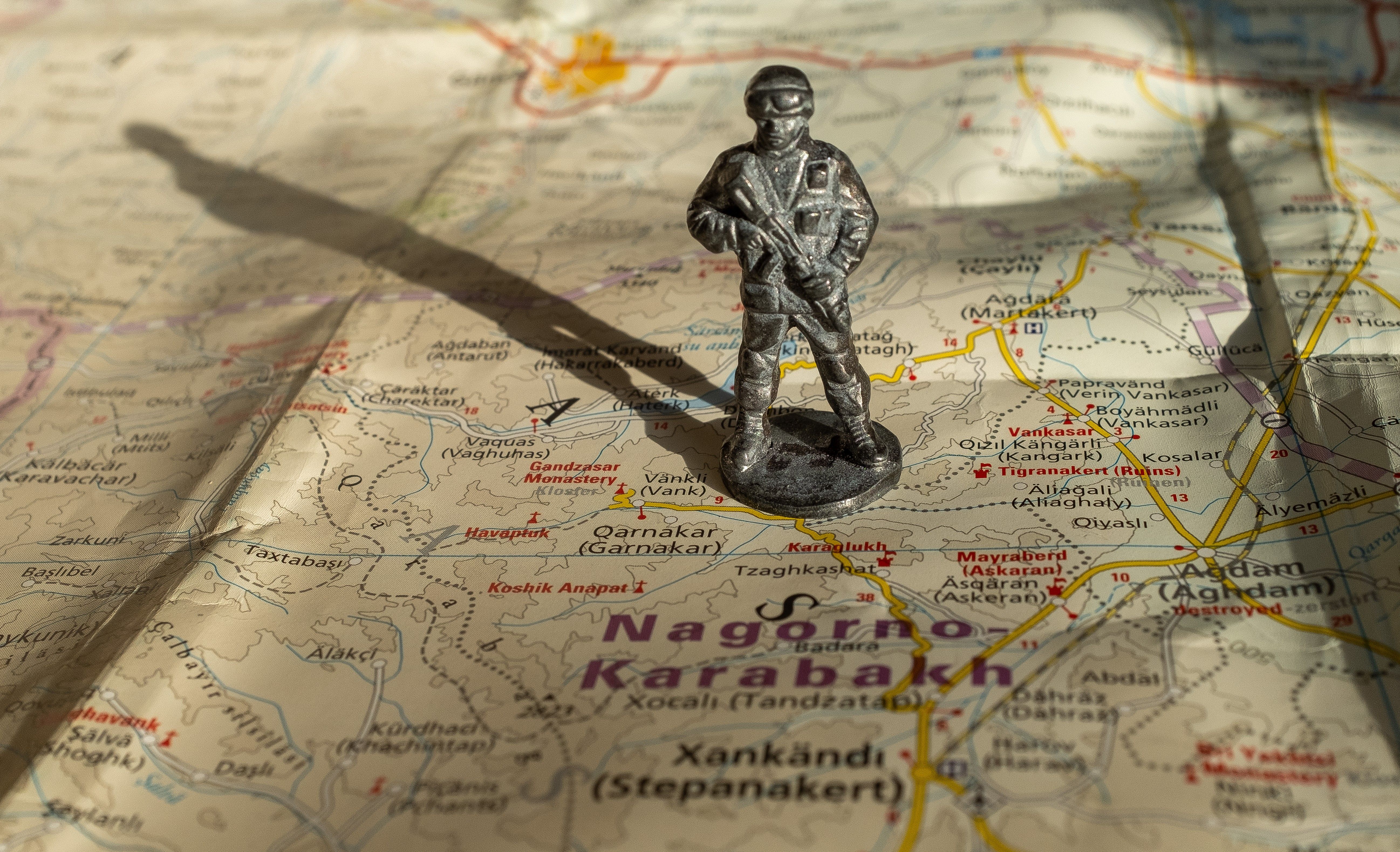The self-proclaimed Nagorno-Karabakh Republic (NKR), known to Armenians as Artsakh, will cease to exist as of January 1, 2024.
The newly elected de facto president, Samvel Shahramanyan, signed a decree on September 28 citing "the difficult and complicated military-political situation, based on the priority of securing the physical security and vital interests of the people of Artsakh."
Armenian Prime Minister Nikol Pashinyan, meanwhile, has described the mass flight of ethnic Armenian civilians precipitated by this development as tantamount to an episode of ethnic cleansing.
The decision on dissolving the NKR came after an Azerbaijani offensive on September 19 that saw Karabakh Armenian forces surrender within a day and begin talks on reintegration with Azerbaijan.
Shahramanyan's decree reads that alongside the gradual dissolution of all state institutions and their subordinate agencies, Karabakh's Armenian population is to be familiarized with "the reintegration conditions presented by the Republic of Azerbaijan after the entry into force of this decree, so that they can make decisions independently and individually on the possibility of staying in (returning to) Nagorno-Karabakh."
The NKR was born out of a civic movement that started in 1988 with the aim of establishing Armenian control over the Nagorno-Karabakh Autonomous Oblast (NKAO), which was then part of Soviet Azerbaijan but had an approximately 85 percent ethnic Armenian population.
The twilight years of the Soviet Union saw episodes of communal violence and displacements of hundreds of thousands of ethnic Armenians from Azerbaijan and vice versa. With the collapse of the Soviet Union, the conflict escalated into an interstate war pitting independent Azerbaijan against the Republic of Armenia and the Armenians of the former NKAO.
The Nagorno-Karabakh Republic was proclaimed during the war on the basis of a referendum held in 1991. After a 1994 ceasefire codified an Armenian victory, the NKR took effective control over most of the territory of the former NKAO and seven surrounding districts of Azerbaijan from which at least 600,000 Azerbaijanis had been expelled.
Over the next two and half decades, the NKR maintained its own political institutions while its economy and military and security apparatus were tightly integrated with those of the Republic of Armenia.
In 2020, Azerbaijan launched an offensive to retake the territory. It received substantial help from Turkey and weapons from Israel. Over 44 days of fighting, Azerbaijan regained the majority of the land it had lost in the first war. The NKR was reduced to a small rump of territory patrolled by peacekeepers from Russia, which brokered a ceasefire on November 9, 2020.
Azerbaijan and Armenia then embarked on a negotiating process aimed at a comprehensive peace deal that achieved little due primarily to differences over the fate of the Karabakh Armenian population.
Last week's offensive has triggered a mass exodus of Armenians from Karabakh mistrustful of assurances from Baku that their rights will be protected under Azerbaijani rule. An Azerbaijani-enforced blockade imposed over the past nine months has only deepened suspicions. As of 2:00 p.m. local time on September 28, 70,500 people had poured over the border into Armenia, according to the Armenian government. That accounts for well over half of the roughly 120,000 people said by Armenian sources to have lived in the self-described republic.
Azerbaijan's Foreign Ministry released a statement rejecting the Armenian prime minister's allegation of ethnic cleansing and insisting that Karabakh Armenians are welcome to stay and are leaving of their own free will. Baku has meanwhile created a web portal, Reintegration.gov.az, providing information to Armenians interested in taking up Azerbaijani citizenship.
Azerbaijan arrests Karabakh's ex-state minister
One of the Armenians in that exodus was not allowed to pass, however. On September 27, Azerbaijan's border service arrested former NKR State Minister Ruben Vardanyan as he tried to leave through the Lachin border checkpoint.
The Russian-Armenian billionaire businessman and philanthropist was born in Yerevan and lived for years in Moscow. Late last year he renounced his Russian citizenship and moved to Stepanakert, NKR's capital, and was appointed state minister. His close ties with the Russian elite, including in the past with President Vladimir Putin, fueled widespread speculation that he had been sent to Karabakh at the Kremlin’s behest to ensure that Russia maintained influence there. But after just over three months on the job, he was ousted.
(Now that he's been arrested, Russia has shown no sign that it will help him.)
Vardanyan remained in Karabakh, establishing himself as a political opponent of both the then-NKR leadership and the Armenian government in Yerevan.
On September 28, Azerbaijan’s State Security Service released video footage of Vardanyan in custody. The agency said he had been placed in pre-trial detention for four months and would face charges of financing terrorism, creating and participating in illegal armed groups, and illegally crossing Azerbaijan's border.
Elsewhere, David Babayan, the NKR's former foreign minister, who most recently served as an advisor to President Shahramanyan, announced on September 28 that he was handing himself over to Azerbaijani law enforcement.
"You all know that I am included in the blacklist of Azerbaijan, and the Azerbaijani side demanded my arrival in Baku for an appropriate investigation. This decision will naturally cause great pain, anxiety and stress, primarily to my loved ones, but I am sure they will understand," he wrote on Facebook.
This article has been republished with permission from Eurasianet.
- Can the US work with Russia in Nagorno-Karabakh? ›
- How great power conflict is affecting the looming Caucasus crisis ›
- The money trail to US inaction in Nagorno-Karabakh - Responsible Statecraft ›















